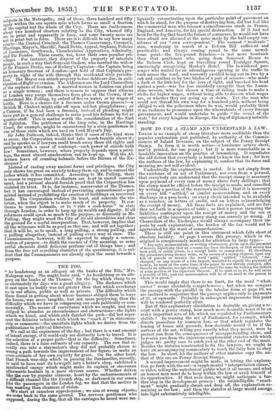HOW TO USE A STAMP AND UNDERSTAND A LAW. THERE
is no example of cheap literature more creditable than the popular explanation just published, by authority of the Commis- sioners of Inland Revenue, on the subject of the Penny Receipt Stamp. In form it is worth notice—a handsome octavo sheet, neatly printed, for one penny ; but it is more remarkable as a laudable innovation on the practice of lawmaking. It repudiates the old fiction that everybody is bound to know the law ; for here the authors of the law, by explaining it, confess that its force and meaning are not self-evident.
Undoubtedly the explanation is useful. It is not simply from the existence of an act of Parliament, nor even from a perusal, that everybody can understand that the receipt-stamp is necessary upon payment of every sum of money above forty shillings; that the stamp must be affixed before the receipt is made, and cancelled by writing a portion of the receiver's initials ; that it is necessary on every bill " settled," or similar memorandum, and on every discharge in a pass-book ; on every check intended to be available as a voucher, on letters of credit, and on letters acknowledging the receipt of money. All these facts are explained, and are fur- ther set forth in a species of table ; so that a person incurring the liabilities contingent upon the receipt of money and the use or omission of the important penny stamp can scarcely go wrong. If Chancellors of the Exchequer would always accompany their im- posts by such explanations, the burden of the tax would not be aggravated by the want of comprehension.
There is still one point in this statement which falls short of absolute lucidity. At page 4 occurs this passage, which in the original is conspicuously marked for attention by large type-
" Any note, memorandum, or writing whatsoever, given upon the payment of money, signifying that an account has been discharged, or that money has been paid, or credit given, is a receipt liable to stamp-duty. If, therefore, the person receiving money write, or by means of a stamp impress, upon any bill of parcels or invoice the word paid,' settled, balanced,' dis- charged,' or any words of a like import, intended to signify the payment of money, he must at the same time, if the paper be not already stamped, affix thereto an adhesive receipt-stamp, and cancel the same by writing his initials or some portion of his signature thereon. If he omit so to do, he will incur a penalty of 101., and the memorandum will bo of no avail to the person to whom it is given."
This would imply that there is no limit, for the word " what- soever " seems absolutely comprehensive ; but when we compare the passage with the parallel in the tabular form at page 10, we are inclined to conjecture that the passage applies only to payments of 2/. or upwards. Probably in subsequent impressions this point will be rendered perfectly clear. But if this explanatory elucidation is desirable on giving a re- ceipt with a penny stamp, how much more desirable must it be on many important acts of life which are regulated by Parliamentary statute ? In conning the act of Parliament, for example, which directs procedure by common law, or that which regulates the leasing of house and grounds, how desirable would it be if the authors of the act, telling you exactly what they meant, were to protect you from the consequences of misapprehending them, and to rescue you from the ingenious supplemental statutes with which judges are pretty sure to catch you at the other end of the maze. Besides the statutes constructed to fix the lawyers, we ought to have an accompanying commentary to teach the laity how to obey the law. In short, let the authors of other statutes copy the au- thor of this one on Penny Receipt Stamps. A second improvement might be made, in letting the explana- tion go forth with the act—a supplemental "interpretation clause," or rider, telling the nntechnical public what it all means, and what an honest man must do to keep within the law or avail himself of its opportunities. If that were done, we might anticipate a fur- ther step in the development process : the unintelligible " enact- ment" might gradually shrink and drop off, the explanation re-. maining as the law; and then the statutes at large would emergfi„, into light substantively intelligible.


























 Previous page
Previous page